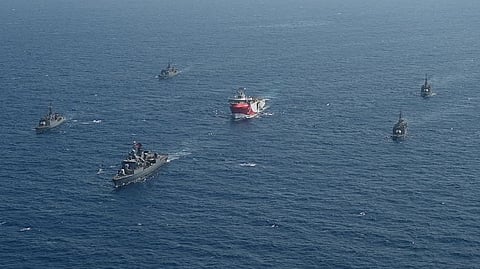

Civil war in Libya, and a complex web of contested, oil and gas prospecting-linked, maritime territorial claims, encompassing EEZs, maritime zones and continental shelves, have ensured increasing tension in the Mediterranean Sea.
Turkey has signed an agreement with Libya over the countries' EEZs, while Greece, to the annoyance of Ankara, has entered into a similar agreement with Egypt.
Within Libya, the internationally-recognised regime of Fayez al-Sarraj is backed by Turkey, Qatar and Somalia. Rebel General Khalifa Haftar has the support of Egypt, the UAE, France, Sudan, Russia and Saudi Arabia.
The Turkish Navy, a rapidly growing and modernising maritime force, has been maintaining an active presence, in the form of two Oliver Hazard Perry-class frigates, off Libya since early this year. There have been reports that these ships have been providing tactical input for drone operations by Turkish-controlled forces within Libya.
In January, the Egyptian Navy, another rapidly-emerging modern blue water force, staged an unprecedented major exercise in the Mediterranean. Participating units reportedly included destroyers, Ambassador-class fast missile-armed attack craft, at least one Type 209 diesel-electric attack submarine, and the French-built landing platform helicopter dock (LHD) Gamal Abdel Nasser.
The exercise included amphibious, surface and sub-surface warfare drills, and live missile firings.
Partly in response to the rising tension, the French Navy, between January and April, deployed a task group centred on the nuclear-powered aircraft carrier Charles de Gaulle to the eastern Mediterranean.
Paris followed this up with the dispatch, in August, of the Mistral-class LHD Tonnerre and the frigate La Fayette to the region. Paris also led EU criticism of Turkish involvement, and withdrew French units from the NATO exercise Sea Guardian in protest. France broadly supports Greece's opposition to both Turkey's intervention in Libya, and its proactive maritime stance, and La Fayette recently took part in an exercise with warships of the Hellenic Navy.
Unsurprisingly there have already been a number of incidents involving warships of the nations involved in what is a very complex scenario. On June 10, the fire control radar of the Turkish frigate Oruc Reis reportedly illuminated the French warship Courbet, which was attempting to stop and check a Tanzanian-flagged merchant vessel, Cirkin, which was suspected of smuggling arms to Libya. Cirkin, which was reportedly being escorted by three Turkish warships, had allegedly turned off its transponder, and had failed to identify itself, or to give its final destination.
Crew members of the Turkish warship reportedly put on bullet-proof vests, and manned the ship's light weaponry during the incident.
On the same day, Cirkin was also spotted by a helicopter operating from the Greek frigate Spetsai, which was operating under the auspices of the EU anti-arms smuggling mission, Operation Irini. The suspect vessel ignored signals from the helicopter telling it to stop, and one of the Turkish escort vessels reportedly transmitted a message claiming that Cirkin was under Turkish government protection.
Since early August, the Turkish seismic research vessel Oruc Reis and deep sea drillship Yavuz have been active in the eastern Mediterranean, and off northern Cyprus respectively. Oruc Reis has an escort of some five Turkish Navy frigates, and is being shadowed by a number of Hellenic Navy warships. Turkish and Greek submarines are also reportedly operating in the Mediterranean.
On August 12, the Turkish frigate Kemal Reis, and a shadowing Hellenic frigate, Limnos, were involved in a collision. Imagery indicates that the Turkish warship sustained damage on its starboard side.
Tensions in the Mediterranean continue to build, but the response from the EU has so far been very restrained. Constraining factors include the dependence of EU nations upon Russia for supplies of oil, gas and coal, and the importance of Turkey's economy, and anti-terrorism capabilities.
Some analysts, though, bearing in mind UK's increasingly close military relationship with France, and the presence on Cyprus of a strategically significant British air base, and electronic intelligence gathering installations, think it probable that British forces will eventually become involved.
